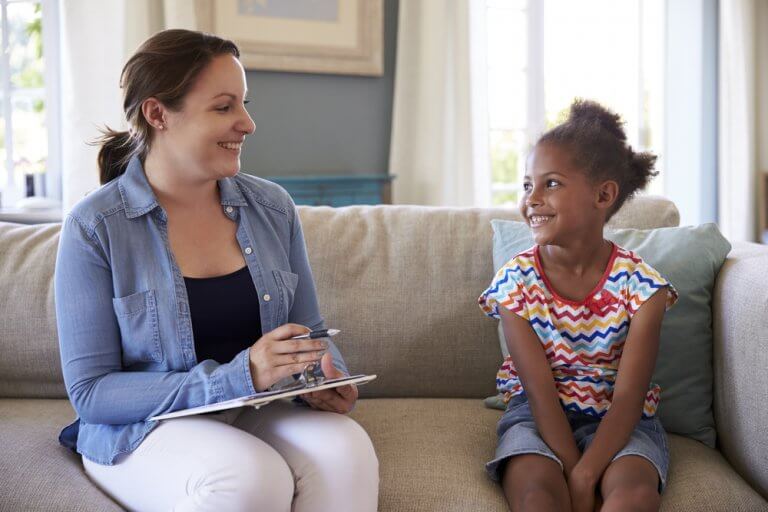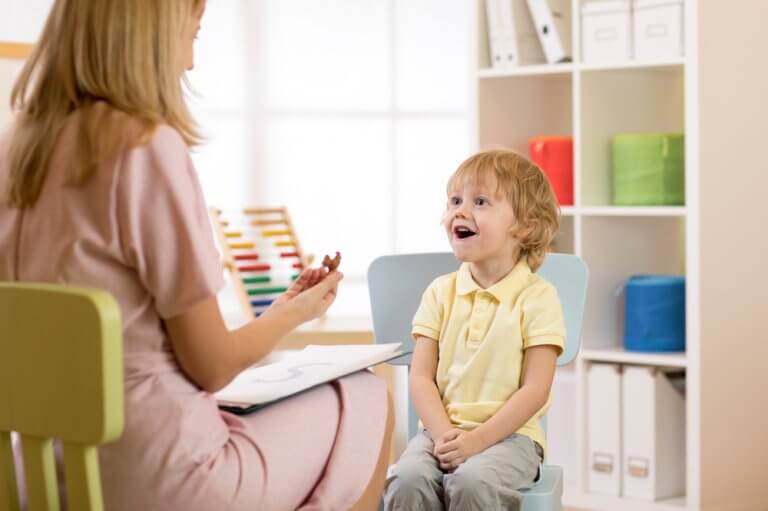What Is Pediatric Psychology? The Basics

Pediatric psychology specializes in the study of psychological processes during childhood as part of child development. It began in the 19th century with a more biological focus. However, in the 20th century the field expanded with theories such as psychoanalysis, cognitive psychology, and constructivism.
Jean Piaget’s contributions set the course for pediatric psychology with his “Learning Theory.” The psychologist dedicated himself to researching the stages of child development.
Piaget offered a description of how children perceive themselves and the world around them, from birth to adolescence.
How pediatric psychology studies children
With an understanding of children as highly complex, this discipline covers children’s motor, linguistic, emotional, perceptive, physical, cognitive, and social aspects. Pediatric psychologists can be based in one scientific school or another, basing their interventions on the contributions of each theory.
Pediatric psychology addresses the way that each developmental stage operates for each child, or vice versa, establishing parameters and codes (generally maintaining a wide margin of relativity) within the field of children’s mental health.
Likewise, pediatric psychologists address children in their environmental context. Of course, it’s vital to know and understand the environment when it comes to establishing a diagnosis and treatment. So the professional must establish:
- How contextual variables (family, school) and biological characteristic (genetics) come together to affect the child’s behavior.
- How environmental changes impact the child’s mental health.

Some topics from Piaget’s cognitive theory
To understand pediatric psychology it’s important to understand the way that the cognitivist Jean Piaget laid it out. Basically, he postulated the theory that, at each age, children naturally acquire the ability to solve certain problems: motor, cognitive, and emotional.
For Piaget, the stages of evolution were understood as cognitive structures. These bases develop over time, always in the same order.
But the idea is not to focus on the subject’s age, rather that each cognitive stage happens without skipping any. At the same time, each stage must integrate smoothly with the one that follows.
The stages of child development according to Jean Piaget are:
- The sensorimotor stage (0 to 2 years). Children get to know the world and their own abilities through their senses.
- The pre-operational stage (2 to 7 years). Children are capable of symbolic thought, which allows, among other things, for speech. However, during this stage their thoughts continue to be egocentric. In other words, they understand the world only through their own perspective.
- The concrete operations stage (7 to 12 years). Children are able to apply logical deduction and deductive principles. Comparative operations such as reversibility and seriality are some skills acquired in this stage. However, this “student period” still excludes abstract thought.
- The formal operations stage (12 years and up). The subject acquires the ability to make hypotheses, projections, and complete formal operations during adolescence and adulthood.
Current trends in pediatric psychology
Today, cultural changes are vertiginous and children present very different behaviors from those of kids 100 years ago. These days you may hear terms like “anxiety disorder.” Or you may recognize “attention deficit,” “sleep disorder,” depression, or more broadly, “Autism spectrum disorder.”

These dysfunctions cause children not to respond to certain standard norms. The traditional theories of pediatric psychology are always being revised and modernized to apply to the needs of new and different generations.
The omnipresence of technology, the crisis of the hetero-patriarchal family, and the creation of new types of families require new theoretical approaches from pediatric psychology.
In this way, there are new ways to see things that continue to change for teaching, schools and learning centers.
In conclusion, an obsolete definition of childhood will create an unbridgeable gap between the new and old generations. As a result, many experts proceed to apply scientific parameters to childhood, widening the gap even more.
Pediatric psychology specializes in the study of psychological processes during childhood as part of child development. It began in the 19th century with a more biological focus. However, in the 20th century the field expanded with theories such as psychoanalysis, cognitive psychology, and constructivism.
Jean Piaget’s contributions set the course for pediatric psychology with his “Learning Theory.” The psychologist dedicated himself to researching the stages of child development.
Piaget offered a description of how children perceive themselves and the world around them, from birth to adolescence.
How pediatric psychology studies children
With an understanding of children as highly complex, this discipline covers children’s motor, linguistic, emotional, perceptive, physical, cognitive, and social aspects. Pediatric psychologists can be based in one scientific school or another, basing their interventions on the contributions of each theory.
Pediatric psychology addresses the way that each developmental stage operates for each child, or vice versa, establishing parameters and codes (generally maintaining a wide margin of relativity) within the field of children’s mental health.
Likewise, pediatric psychologists address children in their environmental context. Of course, it’s vital to know and understand the environment when it comes to establishing a diagnosis and treatment. So the professional must establish:
- How contextual variables (family, school) and biological characteristic (genetics) come together to affect the child’s behavior.
- How environmental changes impact the child’s mental health.

Some topics from Piaget’s cognitive theory
To understand pediatric psychology it’s important to understand the way that the cognitivist Jean Piaget laid it out. Basically, he postulated the theory that, at each age, children naturally acquire the ability to solve certain problems: motor, cognitive, and emotional.
For Piaget, the stages of evolution were understood as cognitive structures. These bases develop over time, always in the same order.
But the idea is not to focus on the subject’s age, rather that each cognitive stage happens without skipping any. At the same time, each stage must integrate smoothly with the one that follows.
The stages of child development according to Jean Piaget are:
- The sensorimotor stage (0 to 2 years). Children get to know the world and their own abilities through their senses.
- The pre-operational stage (2 to 7 years). Children are capable of symbolic thought, which allows, among other things, for speech. However, during this stage their thoughts continue to be egocentric. In other words, they understand the world only through their own perspective.
- The concrete operations stage (7 to 12 years). Children are able to apply logical deduction and deductive principles. Comparative operations such as reversibility and seriality are some skills acquired in this stage. However, this “student period” still excludes abstract thought.
- The formal operations stage (12 years and up). The subject acquires the ability to make hypotheses, projections, and complete formal operations during adolescence and adulthood.
Current trends in pediatric psychology
Today, cultural changes are vertiginous and children present very different behaviors from those of kids 100 years ago. These days you may hear terms like “anxiety disorder.” Or you may recognize “attention deficit,” “sleep disorder,” depression, or more broadly, “Autism spectrum disorder.”

These dysfunctions cause children not to respond to certain standard norms. The traditional theories of pediatric psychology are always being revised and modernized to apply to the needs of new and different generations.
The omnipresence of technology, the crisis of the hetero-patriarchal family, and the creation of new types of families require new theoretical approaches from pediatric psychology.
In this way, there are new ways to see things that continue to change for teaching, schools and learning centers.
In conclusion, an obsolete definition of childhood will create an unbridgeable gap between the new and old generations. As a result, many experts proceed to apply scientific parameters to childhood, widening the gap even more.
All cited sources were thoroughly reviewed by our team to ensure their quality, reliability, currency, and validity. The bibliography of this article was considered reliable and of academic or scientific accuracy.
Dr. José Méndez-Venegas, Psic. Azareel Maya-del Moral. (2011). Psicología pediátrica. Extraído de: http://www.medigraphic.com/pdfs/actpedmex/apm-2011/apm114g.pdf
Yolanda Ferreira Arza. (2000). Psicología infantil en la actualidad. Extraído de: http://www.scielo.org.bo/pdf/rcc/n8/a18.pdf
This text is provided for informational purposes only and does not replace consultation with a professional. If in doubt, consult your specialist.








